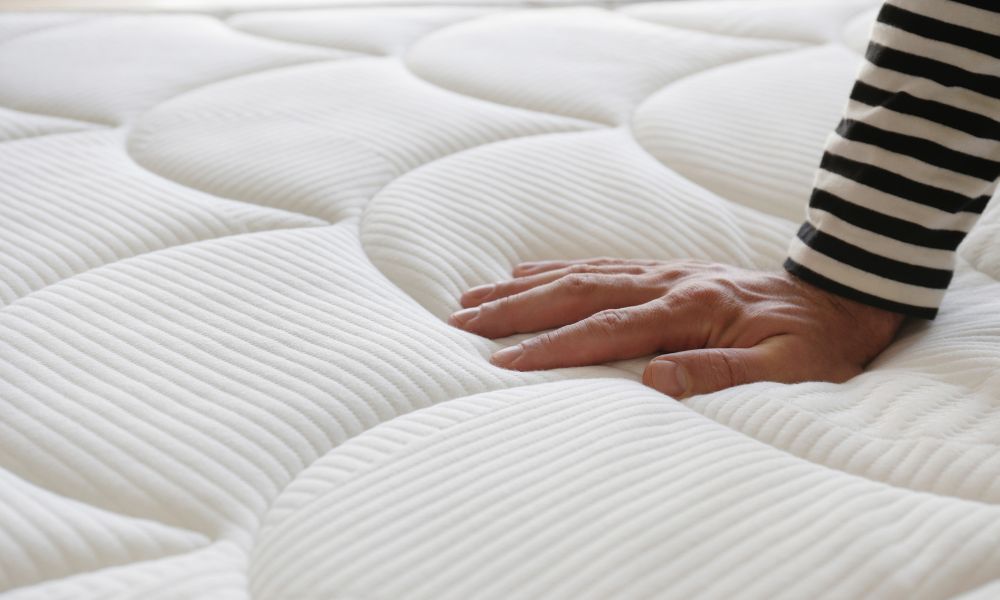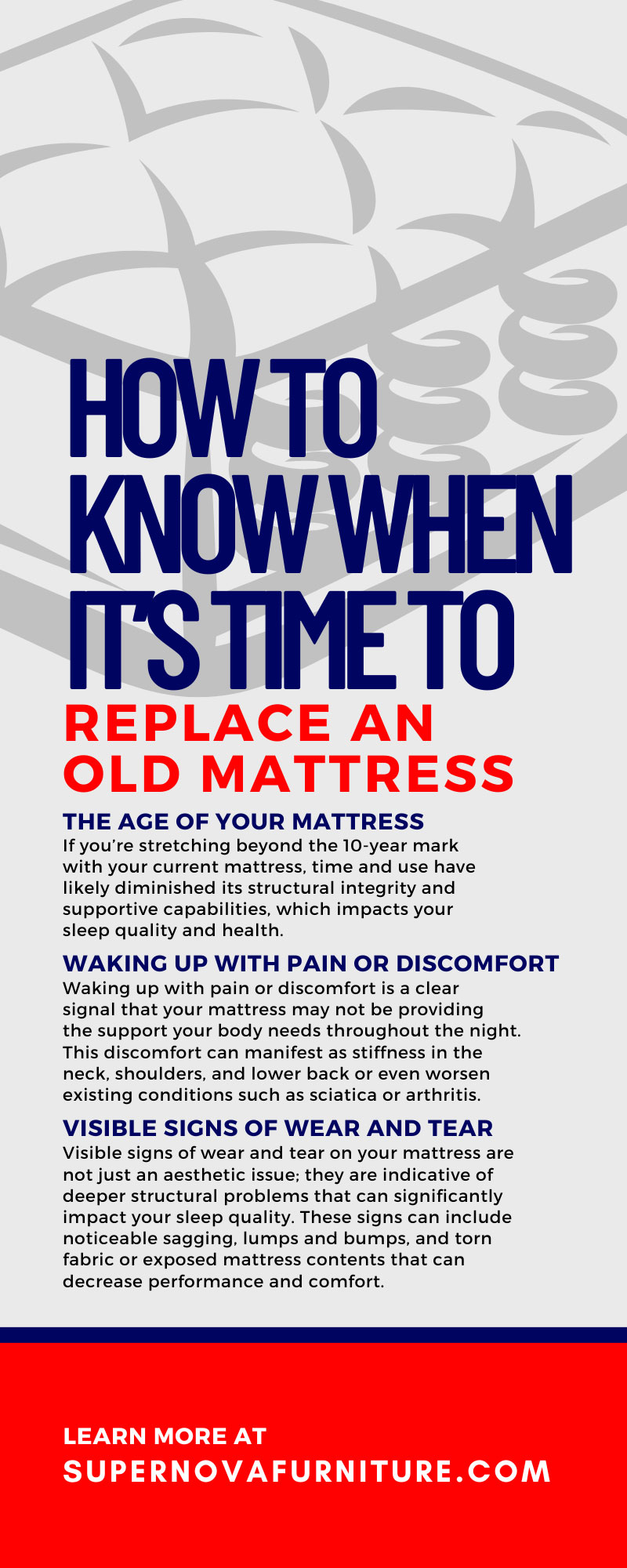How To Know When It’s Time To Replace an Old Mattress

In the quest for a healthier lifestyle, many elements, such as diet, exercise, and stress management, take most of the attention. However, a restful, rejuvenating sleep is crucial because it’s what determines the quality of your day. Central to achieving such quality sleep is the mattress, where you spend nearly a third of your life.
Despite its importance, the gradual decline in a mattress’s performance can be so subtle that it’s easy to dismiss or adapt to its declining support and comfort. This oversight could inadvertently be sabotaging your sleep quality and, by extension, your overall health and daily productivity.
When buying a new mattress, you’re investing in your sleep environment and in a foundation that supports every aspect of your physical and mental well-being. Learning the signs it’s time to replace your old mattress is essential for recognizing when you have an opportunity to better your sleep.
The Age of Your Mattress
One of the most straightforward indicators that it’s time for a mattress upgrade is its age. Industry experts typically recommend changing your mattress every 7-10 years, depending on the quality and material. Factors such as maintenance, the quality of its construction, and its material composition can influence its lifespan.
If you’re stretching beyond the 10-year mark with your current mattress, time and use have likely diminished its structural integrity and supportive capabilities, which impacts your sleep quality and health.
Waking Up With Pain or Discomfort
Waking up with pain or discomfort is a clear signal that your mattress may not be providing the support your body needs throughout the night. This discomfort can manifest as stiffness in the neck, shoulders, and lower back or even worsen existing conditions such as sciatica or arthritis.
A mattress that’s too soft can cause your body to sink too deeply, misaligning your spine and straining your joints. A mattress that’s too firm can exert excessive pressure on key points of your body, such as your hips and shoulders. Over time, this imbalance in support and alignment can disrupt your sleep patterns and lead to chronic pain, affecting your energy levels and overall quality of life.
Visible Signs of Wear and Tear
Visible signs of wear and tear on your mattress are not just an aesthetic issue; they are indicative of deeper structural problems that can significantly impact your sleep quality. These signs can include noticeable sagging, lumps and bumps, and torn fabric or exposed mattress contents that can decrease performance and comfort.
If you notice that your mattress makes excessive noise when you move, it could mean the springs are no longer providing the support they should. Recognizing these physical signs of wear and tear is crucial in determining when it’s time for a mattress replacement.
Allergies or Asthma Symptoms Worsening
If your allergies or asthma symptoms worsen, it could be due to the accumulation of allergens in your old mattress. Over time, mattresses can harbor dust mites, pet dander, pollen, and other allergens that trigger symptoms such as sneezing, coughing, itchy eyes, and difficulty breathing, especially at night.
Dust mites thrive in the warm, humid environment of a used mattress, feeding on dead skin cells and multiplying over the years. Regular cleaning and the use of hypoallergenic mattress covers can mitigate these issues, but they might not be enough to combat years of allergens.
Changes in Sleep Quality or Patterns
Changes in sleep quality or patterns can be subtle yet important signs that your mattress may need replacing. If you toss and turn more than usual, struggle to find a comfortable position, or wake up frequently, your mattress is no longer providing optimal comfort and support.
A decline in sleep quality can lead to feeling tired and unrefreshed upon waking, even after a full night’s sleep. This loss of sleep can have a cascading effect on your day-to-day functioning, impacting your mood, concentration, and energy levels.
Your Lifestyle or Body Has Changed
Significant life changes, be it in your lifestyle or physical body, require a reassessment of what you need from your mattress to ensure optimal sleep quality and support. A noticeable change in body weight can alter how your mattress supports your spine and joints.
Weight gain may require a firmer mattress to prevent excessive sinking, ensuring correct spinal alignment throughout the night. Weight loss might mean your current mattress is now too firm, lacking the cushioning your joints need for comfort.
Temperature Regulation
Over time, the materials in your mattress can degrade, affecting its ability to regulate temperature and potentially disturbing your sleep. Older mattresses, especially those made from certain types of foam or with dense compositions, may retain heat and lead to overheating during the night.
This can interrupt your sleep cycle, making it difficult to stay asleep or to fall asleep. Upgrading to a new mattress with modern materials designed for optimal airflow and temperature regulation can significantly improve your sleep quality by keeping you comfortable throughout the night.
Partner Disturbance Is Increasing
An increase in partner disturbance can be a tangible indication that your mattress no longer suits your shared sleeping arrangements. If you find yourself or your partner waking up at each other’s slightest movements, it might be time to reassess the effectiveness of your mattress in isolating motion.
As mattresses age, they can lose their ability to absorb movement, causing one partner’s movement to disrupt the other’s sleep. This issue can be particularly problematic in older innerspring mattresses or those with worn-out foam.
It Just Doesn’t Feel Right Anymore
Sometimes, the decision to replace a mattress comes from a simple yet profound realization that it just doesn’t feel right anymore. It could emerge from a vague sense of unrest, an inability to relax fully, or a diminishing comfort level that once welcomed you into a deep sleep.
Over the years, your body and its needs evolve, and what once was the perfect mattress may no longer suit those requirements. Trusting this intuitive feeling and acknowledging it as a legitimate reason for change is essential in ensuring that your bedroom remains a haven for restorative sleep.
Understanding when to replace your mattress is more than just an act of household maintenance; it’s an integral component of nurturing your health and enhancing your life’s quality. Recognizing these signs ensures that you’re sleeping on a base that supports your physical well-being and highlights the investment in your mental and emotional health through better sleep quality.
When making this crucial change, remember that our mattress store in Humble, TX, has the best options for you. Quality and customer satisfaction are our main focus. The right store will not only offer a variety of options to suit your unique needs but also provide the guidance required to make an informed decision.
Learn about our financing program and visit us today to take home the best mattress your body can use to enhance your quality of life.
In addition to the great deals that Supernova offers every day at all of their locations, they also have an Outlet Center located at 10000 Northwest Freeway, Houston, TX 77092 that offers items at up to 90% Off the retail price!
